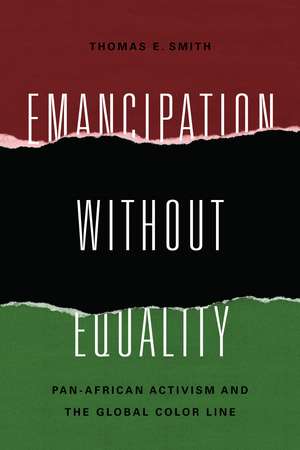Emancipation without Equality: Pan-African Activism and the Global Color Line: African American Intellectual History
Autor Thomas E. Smithen Limba Engleză Paperback – 25 sep 2018
At the Pan–African Conference in London in 1900, W. E. B. Du Bois famously prophesied that the problem of the twentieth century would be the global color line, the elevation of "whiteness" that created a racially divided world. While Pan-Africanism recognized the global nature of the color line in this period, Thomas E. Smith argues that it also pushed against it, advocating for what Du Bois called "opportunities and privileges of modern civilization" to open up to people of all colors.
Covering a period roughly bookended by two international forums, the 1884–1885 Berlin Conference and the 1911 Universal Races Congress, Emancipation without Equality chronicles how activists of African descent fought globally for equal treatment and access to rights associated with post-emancipated citizenship. While Euro-American leaders created a standard to guide the course of imperialism at the Berlin Conference, the proceedings of the Universal Races Congress demonstrated that Pan-Africanism had become a visible part of a growing, global, anti-imperialist protest.
Covering a period roughly bookended by two international forums, the 1884–1885 Berlin Conference and the 1911 Universal Races Congress, Emancipation without Equality chronicles how activists of African descent fought globally for equal treatment and access to rights associated with post-emancipated citizenship. While Euro-American leaders created a standard to guide the course of imperialism at the Berlin Conference, the proceedings of the Universal Races Congress demonstrated that Pan-Africanism had become a visible part of a growing, global, anti-imperialist protest.
Preț: 219.51 lei
Nou
Puncte Express: 329
Preț estimativ în valută:
42.01€ • 43.80$ • 34.91£
42.01€ • 43.80$ • 34.91£
Carte tipărită la comandă
Livrare economică 21 martie-04 aprilie
Preluare comenzi: 021 569.72.76
Specificații
ISBN-13: 9781625343956
ISBN-10: 1625343957
Pagini: 208
Ilustrații: 8 b&w illus.
Dimensiuni: 152 x 229 x 15 mm
Greutate: 0.31 kg
Ediția:First Edition
Editura: University of Massachusetts Press
Colecția University of Massachusetts Press
Seria African American Intellectual History
ISBN-10: 1625343957
Pagini: 208
Ilustrații: 8 b&w illus.
Dimensiuni: 152 x 229 x 15 mm
Greutate: 0.31 kg
Ediția:First Edition
Editura: University of Massachusetts Press
Colecția University of Massachusetts Press
Seria African American Intellectual History
Notă biografică
Thomas E. Smith is associate professor of history at Chadron State College.
Recenzii
"Emancipation without Equality is extremely well written and offers several important interventions in the literature on nineteenth-century abolitionism, Pan-Africanism, colonization, African American intellectual thought, and African American internationalism and transnationalism."—Stephen G. Hall, author of A Faithful Account of the Race: African American Historical Writing in Nineteenth-Century America
"As Smith demonstrates, global imperialism and the rise of a new scientific racism challenged Pan-Africanists to articulate a doctrine of liberation that affirmed black subjectivities without ceding legitimacy to Euro-American standards of civilization and preparedness. What emerged was a vibrant Pan-Africanism attuned to transnational, global, and local dimensions of anti-black racial oppression."—Jeannette Eileen Jones, author of In Search of Brightest Africa: Reimagining the Dark Continent in American Culture, 1884–1936
"Emancipation without Equality joins a growing body of work which challenges the attenuation of race critique to the boundaries of the nation-state. The book eloquently retrieves a crucial yet under-appreciated historical moment of race critique and provides remarkable clarity to the complex links between resurgent empire in the late 19th century and the audacious Pan-Africanism of the early 20th century."—Robbie Shilliam, author of Race and the Undeserving Poor: From Abolition to Brexit
"This slim, readable volume explores the construction and influence of black activist and intellectual networks in the postemancipation US."—CHOICE
"Emancipation without Equality offers nonspecialists a clearly written overview of black American internationalism and Pan-African thinking decades before the Pan-African Congresses in the Post–World War I era . . . [It] is an impressive achievement that provides an original interpretation of Pan-African activism during the Progressive Era."—Journal of the Gilded Age and Progressive Era
"Thomas E. Smith's Emancipation without Equality is a sturdy contribution to scholarship on the Pan-African movement . . . Smith makes a compelling case that the Pan-African movement successfully 'contributed to the normative meaning of human rights.'"—Journal of American History
"As Smith demonstrates, global imperialism and the rise of a new scientific racism challenged Pan-Africanists to articulate a doctrine of liberation that affirmed black subjectivities without ceding legitimacy to Euro-American standards of civilization and preparedness. What emerged was a vibrant Pan-Africanism attuned to transnational, global, and local dimensions of anti-black racial oppression."—Jeannette Eileen Jones, author of In Search of Brightest Africa: Reimagining the Dark Continent in American Culture, 1884–1936
"Emancipation without Equality joins a growing body of work which challenges the attenuation of race critique to the boundaries of the nation-state. The book eloquently retrieves a crucial yet under-appreciated historical moment of race critique and provides remarkable clarity to the complex links between resurgent empire in the late 19th century and the audacious Pan-Africanism of the early 20th century."—Robbie Shilliam, author of Race and the Undeserving Poor: From Abolition to Brexit
"This slim, readable volume explores the construction and influence of black activist and intellectual networks in the postemancipation US."—CHOICE
"Emancipation without Equality offers nonspecialists a clearly written overview of black American internationalism and Pan-African thinking decades before the Pan-African Congresses in the Post–World War I era . . . [It] is an impressive achievement that provides an original interpretation of Pan-African activism during the Progressive Era."—Journal of the Gilded Age and Progressive Era
"Thomas E. Smith's Emancipation without Equality is a sturdy contribution to scholarship on the Pan-African movement . . . Smith makes a compelling case that the Pan-African movement successfully 'contributed to the normative meaning of human rights.'"—Journal of American History








